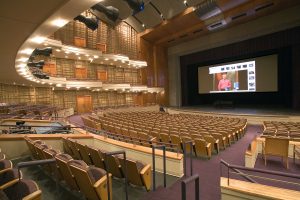
Sanctuary for Sufism
What does it take to be an award-winning architect? We interviewed the acclaimed Alan Ritchie, owner of PJAR Architects. Alan has been recognized for his work on the Metropolitan Residential Tower and the Urban Glass House, both in Manhattan, the Ware Center at Millersville University in Lancaster, Pennsylvania, the Sandler Center in Virginia Beach and the Sanctuary for Sufism Reoriented in Walnut Creek, California.
Rosenberg: What do clients not want in an architect?
Ritchie: Clients do not want an architect whose vision is not compatible with their own. Many homeowners already have a notion of what they want and if you’re not compatible with that, there’s a conflict from day one. Although I’m much more of a modernist, I’m adaptable when it comes to style, whether it’s traditional or modern. However if I think a certain style isn’t appropriate for the space or the building then I’ll express that.
Rosenberg: Tell us about a time when you helped a client out of a predicament.

The Metropolitan, 181 East 90th St., New York
Ritchie: There was an apartment building that we designed on the Upper East Side. The client had purchased the property and they had another architectural firm do the basic floor area ratio (FAR) plans. We were asked to configure and layout the floors and individual units.
When we began, we found that the footprint was a bit tight. The client mentioned they had purchased a townhouse next door as well. I let them know that they might have additional FAR if they included the townhouse in the calculations. They agreed so we cantilevered the high rise tower over the townhouse, which considerably increased the tower footprint by several thousand square feet. That helped us create a better layout and added square footage that was saleable.
Some clients don’t want to take a risk, but others can see the end result and are willing.

Sanctuary for Sufism
For the Sanctuary for Sufism project in Walnut Creek, CA, I designed several cylinders, each had its own individual purpose, and created a dome over the top. There’s a skylight in each dome and when the light comes through it creates a gorgeous pattern across the Sanctuary. The play of light and shadow gave the space the magical feeling they were looking for.
Rosenberg: What do you get the most questions about?
Ritchie: Most people cannot read drawings so they are often surprised by how big or small buildings or spaces are in reality. I always review the drawings with the client, but it never seems to matter. They’re always surprised.
Rosenberg: What gets overlooked most often and how do you handle it when this happens?
Ritchie: It all comes down to the relationship and communication with the client. If something isn’t expressed to me, it isn’t going to be done. The client’s wish list is the most important part of the process so it should be complete.
Also, on bigger jobs, we bring in many consultants so that each part of the project, like lighting, is handled by an expert. The hope is that the job will be done correctly and nothing will be overlooked. The architect is like a conductor of an orchestra on a project–managing and coordinating all aspects so that the end result is in harmony.

Sandler Center for the Performing Arts
When things don’t go as planned, I tend to be laid back and calm. I don’t use bad language. And if that starts I walk away. That never gets us anywhere. Honestly, a lot of the stress is created by the individual. If they think they haven’t been heard, they can get angry and out of hand. I always try to keep cool.
But you have to defend yourself if you think you’re right. I find that no one today wants to admit that they’re wrong. Finger pointing just causes more stress and tension. As the conductor, I try to keep everyone and everything in balance.

The Ware Center of Millersville University
Rosenberg: What makes a trusted vendor?
Ritchie: They must respond honestly and be punctual. Those are the things that attract me. Of course, they must deliver as well. If they don’t deliver what was promised, it’s on me to manage the client and find a way to correct things. It’s not easy to be in that kind of position. So I like to work with vendors I can always count on.
Rosenberg: What is your superpower?
Ritchie: I’ve always listened to and respected other people. I feel I’ve always been courteous as well. And I think there’s a lot to be said for being agreeable, especially today when there’s so much aggressiveness in the world.

330 Spring St., New York
